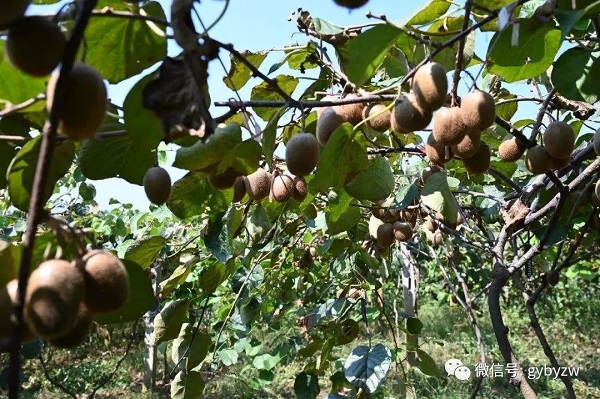Baiyun launches five projects to deepen industrial structure

Kiwi trees bear fruit in a village in Baiyun. [Photo/WeChat account of Baiyun district]
Baiyun in Guiyang, the capital of Southwest China's Guizhou province, has deepened its industrial structure through five major projects to achieve a modern agriculture system and increase farmers' incomes.
The projects include fungi, vegetables, fruits, grains and stock farming. A total of 28.07 million sticks of edible fungi have been planted this year, along with 32,680 mu (2,178.67 hectares) of vegetables and 25,400 mu of fruit trees.
Concerning edible fungi farming, Baiyun depends on its only provincial mushroom-oriented industrial park, which breeds about 400,000 sticks of rare species. A total of 27,000 square meters of steel-frame greenhouse buildings have been newly built in the district.
A total of 21 edible fungi production bases have opened in local villages. These bases have produced 28.07 million fungi sticks, weighing 12,700 metric tons and worth 139 million yuan ($20.72 million).
Baiyun has an R&D center for mushroom strains, with more than 200 varieties collected. Relevant mushroom processing chains have been introduced with a total output value of 27.11 million yuan.
Baiyun has joined the vegetable-basket project to ease the pressure on the supply of vegetables and foodstuffs. Baiyun has launched 15 vegetable bases, which have planted 41,500 tons of vegetables worth 166.18 million yuan.
The district also has plantations for plums, kiwi fruits, cherries, red bayberries and persimmons. Currently, Baiyun has planted fruit trees covering 25,400 mu, with a total output of 7,022.3 tons and an output value of 53.69 million yuan.
To ensure its food security, Baiyun has fully committed to a stable, high-quality and sustainable food system. Statistics show that more than 117,900 mu of grains have been planted, yielding more than 109,900 tons so far.
Baiyun also actively encourages stock farming and is set to have a yearly production of 15,000 swine weighing 1,500 tons.
Baiyun's Mengtai and Baimao villages feed 26,000 laying hens with annual production hitting 300 tons of eggs. Also, the yearly output of 100,000 chickens provides a continuous poultry supply for local citizens.
Presented by China Daily.
黔ICP备05001922号-3
